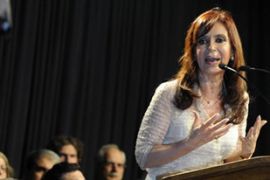Argentina offers farmers deal
Farmers say concessions not enough and vow to continue protests.

Published On 1 Apr 2008
“In the name of all Argentines, I ask you once and for all … let the trucks go through,” Kirchner said, appealing to the farmers.
“We are here to talk. We are open to dialogue.”
Roadblocks ‘remain’
| Argentina’s economic woes |
 Although rich in natural resources, Argentina’s 39.5 million population has suffered in several economic crises in recent decades Fiscal deficits, high inflation and mounting debts culminated in 2001’s economic crisis, which sparked protests, currency devaluation and debt defaults Sixty per cent of Argentinians were also pushed below the poverty line C ountry’s main exports include soya beans, corn, wheat, petroleum, gas and vehicles Inflation currently in double digits and farmers say recent tax increases on goods such as soya beans, sunflower oil and beef by up to 45 per cent to boost revenues will cripple their livelihoods Source: CIA World Factbook |
After the speech, farmers held a news conference in which they said they would continue their protests, which have blocked highways and held back farm goods since March 13, until at least Wednesday.
They said the measures offered by the government were not new.
Mario Llambias, a strike organiser, said that 400 road blockades were still in place across much of Argentina.
“We continue to insist that the government doesn’t understand what is at the root of the problem,” Llambias was quoted by AP as saying.
“I believe the president is ill-advised.”
Farmers in Argentina restarted their national strike over an increase on Sunday after negotiations with the government failed.
Small farmers complain that they have been unfairly hit by a March 11 presidential decree that dramatically increased export taxes on soya beans from 35 per cent to as much as 45 per cent, and also placed new duties on other farm exports.
The Argentinian government says the measures are needed to stem rising inflation, which is now in double digits.
There are also environmental concerns that unrestrained soya production could deplete soil quality and cause further deforestation.
Source: News Agencies